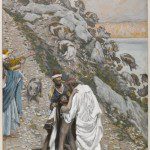[many thanks to Jimmy Akin for massive citation of his research]

Herod the Great, by James Tissot (1836-1902) [public domain / Wikimedia Commons]
*****
Atheist contra-Christian polemicist and biblical skeptic Jonathan MS Pearce has challenged me to grapple with his material on the biblical infancy narratives of Jesus (that, of course, asserts massive contradictions). I’m more than happy to do so. At first I hesitated due to time constraints and a feeling that scholars have done — or could do — a much better job, but he pressed the issue, so he is stuck with me now. As the old saying goes, “be careful what you wish for.” Once I fully commit myself to a debate, I’m a relentless bulldog. He first directed me to his article, “Debunking the Nativity – Quirinius vs Herod and the Ten Year Gap” (12-21-16). His words will be in blue.
*****
Jonathan introduces his case as follows:
One of the biggest and most talked about contradiction of the nativity accounts concerns the dating of these two core events in each of the Gospels: the census of Quirinius and Herod. [he then cites Lk 2:1-2 and Matthew 2:1-4, which he assumes — what a surprise! — are blatantly contradictory] . . .
Herod was in charge of Judea at the time of Jesus’ birth. Thus using simple logic we can deduct that, at the time of Jesus’ birth, both the census of Quirinius took place and Herod lived. However, this is extremely problematic since we know that the census took place in 6 CE and Herod died in 4 (0r 5) BCE. This is a gap of at least ten years! It is at least ten years since if Herod was alive at the time of Jesus’ birth and we know he ordered a massacre and suchlike (all of which would have taken some time), then we know he would have survived for some time around this moment and after the birth. This is quite a long period of time to have as some anomaly. On the face of it, either one or both of the Gospel authors are lying. They are simply claiming things as facts which are impossible.
He more or less entirely rests his case on the date of Herod the Great’s death being 4 BC or 5 BC:
Thus based on this list derived from multiple accounts, we can surmise that Herod definitely ruled no later than 4 BCE. We can also use evidence of coinage for Varus’ rule which end in 4 BCE.
To further state the case, Josephus (Jewish War 1.670) has Herod’s son Archelaus ending his reign, which started at the death of his father Herod the Great’s death, after ten years of rule in 6 CE. This means that his father must have died in 4 BCE or shortly before. . . .
To conclude this section, it seems to be irrefutable, given the evidence, that Herod the Great died in either 4 or 5 BCE. . . .
Therefore, it is safe to say that Herod did indeed die in 4 or 5 BCE and that if Jesus was born at this time, any claims of a census coinciding with this timeframe would need some serious investigation. On the face of it, the contradiction between Luke and Matthew still clearly stands. . . .
As Richard Carrier (2011) says: “So the case for any date earlier than 5 B.C. or later than 4 B.C. for Herod’s death is simply untenable in every respect.”
Jonathan bases this primarily on evidence from the Jewish historian Josephus:
The famous contemporary Jewish historian Josephus provides much of the evidence for the timing of Herod’s death. . . .
The evidence comes from Josephus, Dio and coinage, as well as Roman records of governorship of Judea. Just taking Josephus alone, the various accounts and claims he makes are considerably interwoven with other facts. . . . It is far more probable that, in this particular case, Josephus is correct . . .
He also appeals to a majority head count of scholars (which is relevant, I agree, yet dangerously close to the genetic fallacy [origins determine truthfulness] or a version of the good ol’ ad populum fallacy: “lots of people [scholars] believe x, therefore it must be true.”):
Some scholars now argue that the eclipse could have been later and conclude that Herod actually died closer to 1 BCE, but these are in the great minority, the motivation of which seems to be to try to get Matthew out of this issue.
Note that he takes a gratuitous potshot at the unsavory “motivation” of the scholars who dissent on the issue (whereas the ones who agree with him — especially the atheists — are, of course, utterly objective and of the highest and noblest motives, always).
Blessedly, Jonathan also graciously provides the way out of his “dilemma” for the Christian apologist:
The Christian is left with several options: either question the date that Herod died, or that the census took place, or claim that Quirinius knocked around twice in the area, or had two censuses.
Thanks, Jonathan, for the suggestion of how to dismantle the argument of your paper. And so I opt for #1: I question your date for Herod the Great’s death. Wikipedia (“Herod the Great”) takes Jonathan’s position but is fair and thorough enough to note seven scholars who opt for a date of 1 BC (footnotes 20, 52-57):
1. Steinmann, Andrew “When Did Herod the Great Reign?”, Novum Testamentum, Volume 51, Number 1, 2009, pp. 1–29.
2. Edwards, Ormond. “Herodian Chronology”, Palestine Exploration Quarterly 114 (1982) 29–42
3. Keresztes, Paul. Imperial Rome and the Christians: From Herod the Great to About 200 AD (Lanham, Maryland: University Press of America, 1989), pp.1–43.
4. Yamauchi, Edwin M., editor (1989). “The Nativity and Herod’s Death”. Chronos, Kairos, Christos: Nativity and Chronological Studies Presented to Jack Finegan. Winona Lake, Indiana: Eisenbrauns: 85–92.
5. Finegan, Jack. Handbook of Biblical Chronology, Rev. ed. (Peabody, MA: Hendrickson, 1998) 300, §516.
6. B. MAHIEU – Between Rome and Jerusalem. Herod the Great and his Sons in their Struggle for Recognition in: Orientalia Lovaniensia Analecta 208 (Brill 2012) pp. 235-243.
7. Filmer, W. E. “Chronology of the Reign of Herod the Great”, Journal of Theological Studies ns 17 (1966), 283–298.
Jonathan mentioned Steinmann and immediately added that Richard Carrier refuted his view. He merely mocks Finegan. But these guys who hold to the 1 BC death date are no dummies. Steinmann “is Distinguished Professor of Theology and Hebrew at Concordia University Chicago. He has authored a dozen books and numerous articles relating to Old Testament/Hebrew Bible, Biblical Hebrew, and Biblical Aramaic. His publications include books on the Old Testament canon, biblical chronology, Hebrew and Aramaic grammar, and commentaries on several Old Testament books . . . he received a PhD in Near Eastern Studies at the University of Michigan.”
Edwin M. Yamauchi is a very distinguished Church historian, who studied “Mandaean Gnostic texts as part of his Ph.D. dissertation at Brandeis University. . . . and expanded his linguistic studies in ancient near eastern languages, which included Hebrew, Aramaic, Akkadian, Ugaritic, Arabic, Syriac, and Coptic. In all he has immersed himself in 22 different languages. . . . Yamauchi’s areas of expertise include: Ancient History, Old Testament, New Testament, Early Church History, Gnosticism, and Biblical Archaeology. He has been awarded eight fellowships, contributed chapters to several books, articles in reference works, and has published 80 essays in 37 scholarly journals.”
Jack Finegan (1908-2000) was Professor Emeritus of New Testament History and Archaeology at the Pacific School of Religion in Berkeley, California. His long list of publications include a number of volumes on biblical archaeology.
I shall be drawing from a great deal of excellent research by my friend and fellow Catholic apologist Jimmy Akin, whose three articles below cast (at least in my humble opinion) grave doubt on Jonathan’s confidence in Herod’s death date (these numbers will be used for citation purposes):
1) “The 100-year old mistake about the Birth of Jesus” (4-13-13)
2) “Jesus’ birth and when Herod the Great really died” (April 2013)
3) “Does Luke Contradict Himself on When Jesus Was Born?” (9-12-14)
Jimmy Akin offers a stunning series of various dazzling historical arguments: far too complex to summarize, but I’ll try to present some key highlights. For example, the available data about a lunar eclipse that Josephus mentions (and that Jonathan draws an argument from):
There was, indeed, a partial lunar eclipse in 4 B.C., which took place 29 days before Passover.
However, this was not the only lunar eclipse in the period. There was another lunar eclipse in 1 B.C., which was 89 days before Passover.
Now here’s the thing:
1) Since there is more than one eclipse in this period, you can’t cite the 4 B.C. eclipse as evidence supporting a 4 B.C. date in particular.
You have to consider other eclipses in the right time frame and see which best fits the evidence.
2) The lunar eclipse in 4 B.C. was only partial, but the lunar eclipse in 1 B.C. was full.
Josephus doesn’t say it was a partial lunar eclipse. He says it was a lunar eclipse, and a full eclipse fits that description better.
3) The 4 B.C. span of 29 days between the eclipse and Passover is too short.
Josephus doesn’t just say that Herod died between the eclipse and Passover. He also names a bunch of things Herod did during that period, including trips that required travel time.
As contemporary biblical chronologer Andrew E. Steinmann points out:
[A]ll of the events that happened between these two [the lunar eclipse and Passover] would have taken a minimum of 41 days had each one of them taken place as quickly as possible. A more reasonable estimate is between 60 and 90 days [From Abraham to Paul, 231 (Dave: by Andrew Steinmann) ].
Thus, again, the 1 B.C. lunar eclipse–89 days before Passover–better fits what Josephus describes. [1]
Akin analyzes (in this same article) Josephus’ arguments as to when Herod was appointed king, when he conquered Jerusalem, and when his sons began to reign, and found them also wanting. He concludes:
All four of the main arguments proposed are problematic:
1) The first argument names an impossible date (one that did not exist) for the beginning of Herod’s reign.
2) Josephus contradicts himself about when Herod conquered Jerusalem.
3) There is another lunar eclipse that fits what Josephus says even better.
4) We have evidence that Herod began giving his sons rulership roles before he died. [based on assertions from Steinmann] [1]
Akin also notes that Josephus counted years in a way contrary to those utilizing his conclusions to arrive at the 4 BC date:
Kings don’t tend to come into office on New Year’s Day, and so they often serve a partial year before the next calendar year begins (regardless of which calendar is used).
They also don’t die on the last day of the year, typically, so they also serve a partial year at the end of their reigns.
This creates complications for historians, because ancient authors sometimes count these additional part-years (especially the one at the beginning of the reign) as a full year.
Or they ignore the calendar year and treat the time that a king came into office as a kind of birthday and reckon his reign in years from that point.
What scheme was Josephus using?
Advocates of the idea that Herod died in 4 B.C. argue that he was named king in 40 B.C. To square that with a 37-year reign ending in 4. B.C., they must count the part year at the beginning of his reign and the part year at the end of it as years. That’s the only way the math will work out.
The problem is that this is not how Josephus would have reckoned the years.
Biblical chronology scholar Andrew E. Steinmann comments:
[T]here is no evidence for this [inclusive way of reckoning the partial years]–and every other reign in this period, including those of the Jewish high priests, are reckoned non-inclusively by Josephus [From Abraham to Paul, 223].
In other words, Josephus does not count the partial first year when dating reigns in this period. [2]
Akin also casts doubt on how Josephus reckoned Herod’s appointment as king, concluding:
Given how Josephus dates reigns in this period, he would not have counted Herod’s partial first year in 39 B.C. but would have started his count with 38 B.C.
Count 37 years forward from that and you have 1 B.C. [2]
He also states that “Josephus gives contradictory dating information for Herod’s conquest of Jerusalem”. [2] He concludes this article:
Putting together the pieces above, we have:
- Reason to think Herod died in 1 B.C. based on the amount of time he served after being appointed king by the Romans.
- Reason to think Herod died in either 2 or 1 B.C. based on the amount of time he served after conquering Jerusalem.
- Reason to think Herod died in 1 B.C. because of the lunar eclipse that occurred before Passover.
More specifically, he would have died between January 10, 1 B.C. (the date of the lunar eclipse) and April 11, 1 B.C. (the date of Passover).
Most likely, it was closer to the latter date, since Josephus records a bunch of things Herod did after the eclipse and before his death, some of which required significant travel time. [2]
Akin moves onto the question of the date of Jesus’ birth in his remaining equally fascinating article:
Luke 2 begins with a time cue that connects the birth of Jesus to the reign of Augustus Caesar. Luke 3 begins with an even more elaborate time cue linking the beginning of Jesus’ adult ministry to the reign of Augustus’s successor, Tiberius.
Luke writes:
In the fifteenth year of the reign of Tiberius Caesar, Pontius Pilate being governor of Judea, and Herod being tetrarch of Galilee, and his brother Philip tetrarch of the region of Ituraea and Trachonitis, and Lysanias tetrarch of Abilene, in the high-priesthood of Annas and Caiaphas, the word of God came to John the son of Zechariah in the wilderness [Luke 3:1-2].
The fifteenth year of Tiberius Caesar is what we would call A.D. 28/29.
After John’s ministry begins, Jesus quickly comes and is baptized, thus beginning his own ministry.
When that happens, Luke informs us:
Jesus, when he began his ministry, was about thirty years of age [Luke 3:23].
If you back up 30 years from A.D. 28/29 (remembering that there is no “year 0” so you skip from A.D. 1 directly to 1 B.C.), you land in 2/3 B.C., which is the year that the early Church Fathers overwhelmingly assign Jesus’ birth to. [3]
Thus, if Akin’s reasoning is correct (as I believe it is), Jesus was born before Herod the Great died, precisely as Matthew 2:1 (RSV) states: “. . . Jesus was born in Bethlehem of Judea in the days of Herod the king . . .”
Lastly, Steinmann makes an argument for a 1 BC death of Herod from the coinage of the period:
Additional support for Philip having been officially appointed tetrarch after the death of his father in 1 B.C. may be found in numismatics. A number of coins issued by Philip during his reign are known. The earliest bear the date “year 5,” which would correspond to A.D. 1. This fits well with Philip serving as administrator under his father from 4–1 B.C. He counted those as the first four years of his reign, but since he was not officially recognized by Rome as an independent client ruler, he had no authority to issue coins during those years. However, he was in position to issue coinage soon after being named tetrarch sometime in 1 B.C., and the first coins appear the next year, A.D. 1, antedating his reign to 4 B.C. While the numismatic evidence is not conclusive proof of Herod’s death in 1 B.C., it is highly suggestive.
Given the explicit statements of Josephus about the authority and honor Herod had granted his sons during the last years of his life, we can understand why all three of his successors decided to antedate their reigns to the time when they were granted a measure of royal authority while their father was still alive. Although they were not officially recognized by Rome as ethnarch or tetrarchs until after Herod’s death, they nevertheless appear to have reckoned their reigns from about 4 B.C.
(From Abraham to Paul: A Biblical Chronology: St. Louis: Concordia, 2011, pp. 235–238 [citation])
*****













